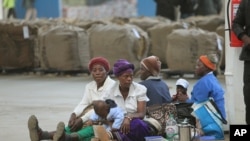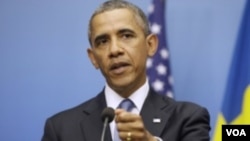The Paris Climate Change Summit entered its second day Tuesday with Zimbabwe and other developing countries demanding to see concrete agreements on reducing greenhouse gas emission and a commitment to assist developing nations in fighting the effects of climate change.
President of the Zimbabwe Commercial Farmers Union, Wonder Chabikwa, says the country's farmers are already experiencing the effects of global warming.
Chabikwa urged developed nations to invest in irrigation. “We are already feeling the effects of climate change here in Zimbabwe. The developed nations must at least try to finance irrigation schemes otherwise there is going to be starvation.”
According to the World Bank, Africa needs to spend $5 to $10 billion a year immediately to adapt to a 2C warming, rising to between $20 and $50 billion by 2050, and close to $100 billion if temperatures increase by 4C.
The bank says sub-Saharan Africa is highly vulnerable to climate shocks, and research shows that could have far-ranging impact on everything from child stunting and malaria to food price increases and droughts.
Wealthy countries in 2009 pledged to mobilize $100 billion annually by 2020 and according to some estimates are about two-thirds of the way there.
Developing countries want to see a promise in Paris that the $100 billion is a “floor” of funding that will rise over time, something wealthy nations like the United States say they’re not ready to agree to.
A major announcement by United States president Barack Obama, 19 other world leaders and Microsoft founder Bill Gates to double research and development money for clean energy is expected to inject momentum into the finance discussion.
But leaders also acknowledged it is not a substitute for a financial package to help poorer countries grappling with the impacts of climate change and trying to transition away from fossil fuels.
Meanwhile, speaking to reporters Tuesday in Paris, President Obama expressed optimism that political leaders would commit to address climate change.
Mr. Obama said climate change is "an economic and a security imperative that we have to tackle now."
Before flying home to Washington, the president said he and the other leaders at the summit agreed that controlling climate change is the most important issue facing the entire planet.
"This one trend - climate change - affects all trends. If we let the world keep warming as fast as it is, and sea levels rising as fast as they are, and weather patterns keep shifting in more unexpected ways, then before long, we are going to have to devote more and more and more of our economic and military resources not to growing opportunity for our people but adapting to the various consequences of a changing planet."
The U.N. weather agency says the average global temperature will have risen by one degree by the end of 2015.
Scientists say a rise of another degree in the years ahead could produce potentially catastrophic global effects. U.S. officials announced that 73 American corporations have pledged support for action on climate change, with the goal of reducing greenhouse-gas emissions by as much as 50 percent, cutting water usage by 80 percent, and using energy sources that are 100 percent renewable.
Mr. Obama says he is confident that crisis can be averted. "I actually think we are going to solve this thing.
The U.S. has pledged to cut emissions up to 28 percent by 2025, while China set targets to peak its emissions by about 2030. Obama also held separate talks on the "urgent threat" of climate change with India's Prime Minister Narendra Modi. The U.S. president highlighted India's work on a solar alliance to deploy affordable clean energy to developing countries.
French President Francois Hollande announced Tuesday that France will give African countries $2.1 billion over the next four years to develop renewable energy sources and replace fossil fuels.
The World Bank has devised a US$16 billion designed to help Africa adapt to climate change and prevent millions of people from sliding into poverty.
By fast-tracking clean energy, efficient farming and urban protection, the measures promise to greatly increase renewable energy across the continent, bolster food production and lead to the planting of billions of trees.
It is also hoped that the scheme will improve life in cities and reduce poverty, migration and conflict.







